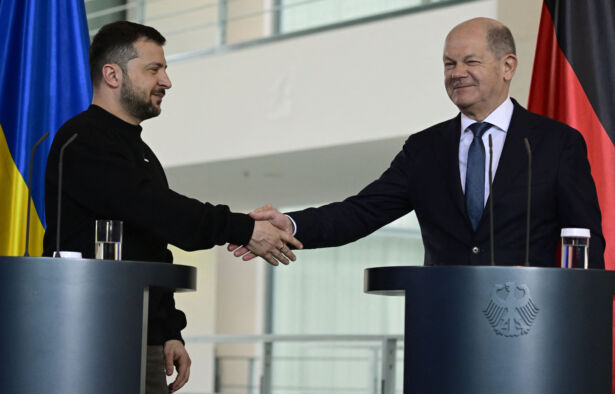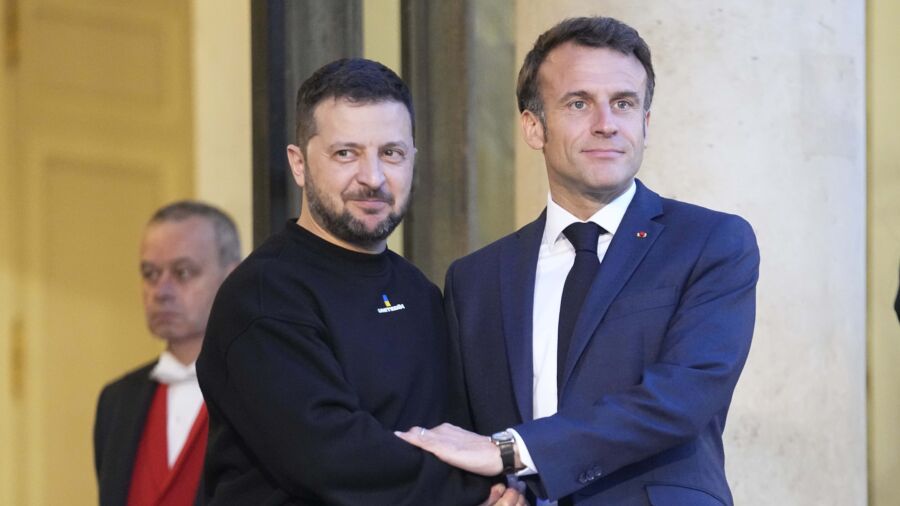PARIS—France pledged additional military aid for Ukraine on Sunday, including light tanks, armored vehicles, training for soldiers, and other assistance as the Ukrainians gear up for a counteroffensive against Russian forces, following surprise talks in Paris between the Ukrainian and French presidents.
Ukraine’s Volodymyr Zelenskyy and France’s Emmanuel Macron met for about three hours at the French presidential Elysee Palace—an encounter kept under wraps until shortly before the Ukrainian leader’s arrival in Paris from Germany on a French government jet, extending his multi-stop European tour.
With Ukraine planning to go on the offensive hoping to retake Russian-occupied territory, military aid was a top agenda item. Macron’s office said France will supply dozens of light tanks and armored vehicles “in the weeks ahead,” without giving specific numbers. Also promised were more air defense systems, but again details weren’t made public.
More Ukrainians will also be made battle-ready, with France aiming to train about 2,000 Ukrainian soldiers in France this year and nearly 4,000 others in Poland as part of a wider European effort, Macron’s office said.
In a statement, France described its support for Ukraine’s independence, sovereignty, and territorial integrity as “unwavering” and promised that its political, economic, humanitarian, and military aid will continue “for as long as necessary.”
In a tweet on his arrival, Zelenskyy said: “With each visit, Ukraine’s defense and offensive capabilities are expanding. The ties with Europe are getting stronger, and the pressure on Russia is growing.”
France has supplied Ukraine with an array of weaponry, include air defense systems, light tanks, howitzers, and other arms and equipment and fuel.
France dispatched a plane to pick up Zelenskyy in Germany, where he met with Chancellor Olaf Scholz earlier Sunday and discussed his country’s planned counteroffensive. Zelenskyy said it will aim to liberate Russian-occupied areas within Ukraine’s internationally recognized borders, and not attack Russian territory.

The Washington Post cited previously undisclosed documents from a trove of U.S. intelligence leaks suggesting that Zelenskyy has considered trying to capture areas in Russia proper for possible use as bargaining chips in peace negotiations to end the war launched by Moscow in February 2022. This would put him at odds with Western governments that have insisted that weapons they provide must not be used to attack targets in Russia.
Asked about the report, Zelenskyy said: “We don’t attack Russian territory, we liberate our own legitimate territory.”
“We have neither the time nor the strength [to attack Russia],” he said, according to an official interpreter. “And we also don’t have weapons to spare, with which we could do this.”
“We are preparing a counterattack for the illegally occupied areas based on our constitutionally defined legitimate borders, which are recognized internationally,” Zelenskyy said.
Among areas still occupied by Russia are the Crimean peninsula and parts of eastern Ukraine with mainly Russian-speaking populations.
A Luftwaffe jet flew Zelenskyy to the German capital from Rome, where he met Saturday with Pope Francis and Italian Premier Giorgia Meloni.
It was his first visit to Berlin since the start of the invasion and came a day after the German government announced a new package of military aid for Ukraine worth more than 2.7 billion euros ($3 billion), including tanks, anti-aircraft systems and ammunition.
Zelenskyy thanked Scholz for the support, saying Germany is now second only behind the United States in providing aid to Ukraine—and joked that he is working to make it the biggest donor.
“German air defense systems, artillery, tanks and infantry fighting vehicles are saving Ukrainian lives and bringing us closer to victory. Germany is a reliable ally! Together we are bringing peace closer!” he wrote on Twitter.
Scholz said that Berlin has so far given Kyiv some 17 billion euros in bilateral aid and that it can expect more in future.
After initially hesitating to provide Ukraine with lethal weapons, Germany has become one of the biggest suppliers of arms to Ukraine, including Leopard 1 and 2 battle tanks, and the sophisticated IRIS-T SLM air defense system. Modern Western hardware is considered crucial if Ukraine is to succeed in its planned counteroffensive.
In the western German city of Aachen, Zelenskyy also received the prestigious International Charlemagne Prize, awarded to him and the people of Ukraine.
In her congratulatory speech, European Commission President Ursula von der Leyen compared the war in Ukraine to the fall of the Iron Curtain more than 30 years ago.
“Every generation has its moment when it has to stand up to defend democracy and what it believes in,” she said. “For us, that moment has come.”
Zelenskyy accused Moscow of trying to turn back the clock of European history.
“Modern Russia waged war not just on us, as a free and sovereign state, not just against united Europe as a global symbol of peace and prosperity,” he said in his acceptance speech. “This is Russia’s war for the past.”
In other developments:
—Zelenskyy’s chief aide, Andriy Yermak, said Sunday that five civilians died in Ukraine’s southern Kherson region when an unexploded Russian shell blew up.
—Overnight, Russia launched a “massive” attack on Ukraine with Iranian-made Shahed explosive drones, which wounded more than 30 people, according to the Ukrainian military. Eighteen of the 23 drones were shot down, but those that got through, and wreckage from those intercepted, damaged 50 apartment buildings, private homes and other buildings, the military said without providing further details.
—Russia also hit the western city of Ternopil and southern city of Mykolaiv with rockets, wounding an unspecified number of civilians.
—Shelling by Russian forces killed a 59-year-old woman and a 65-year-old man Sunday in the Chuhuiv district of Ukraine’s northeastern Kharkiv province, regional Gov. Oleh Syniehubov reported on Telegram.
—Russia’s Defense Ministry said Sunday that Ukrainian forces had killed two of its colonels in the Bakhmut area.
By John Leicester and Frank Jordans

